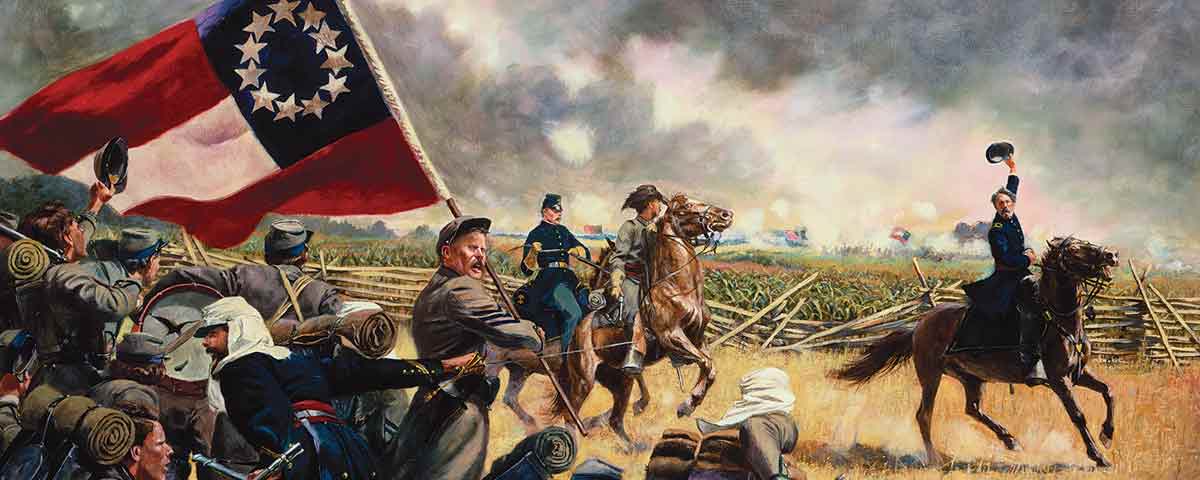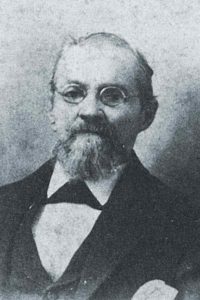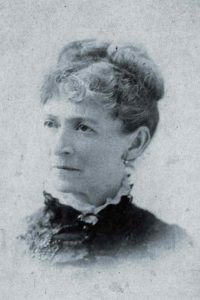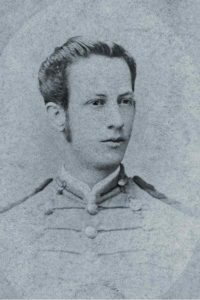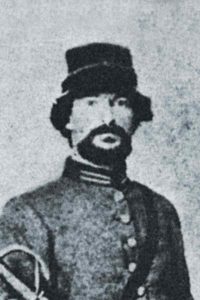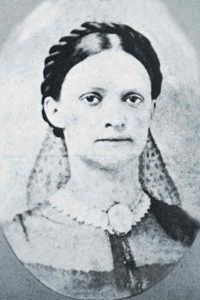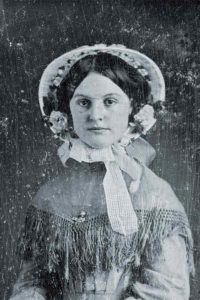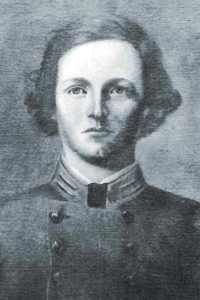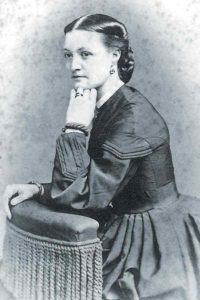Elodie Todd loved a Confederate officer, her half-sister married Abraham Lincoln
[dropcap]E[/dropcap]lodie Todd, a native Kentuckian, was stunned when Confederate officer Nathaniel Dawson proposed marriage just before his company left his native Selma, Alabama. She was 12 years his junior and worried her family would never approve of the engagement, considering she barely knew Dawson. But Todd accepted, and over the next year, April 1861 through April 1862, the couple wrote more than 200,000 words to each other.
Their letters, carefully edited and contextualized by historians Stephen Berry and Angela Esco Elder in Practical Strangers: The Courtship Correspondence of Nathaniel Dawson and Elodie Todd, Sister of Mary Todd Lincoln (University of Georgia Press, 2017), offer insights into a family at war, and not just any family, but one that reflected both its fame and its border-state roots. Five of the Todd siblings, including First Lady Mary Todd Lincoln, supported the Union, while nine, including Elodie, supported the Confederacy.
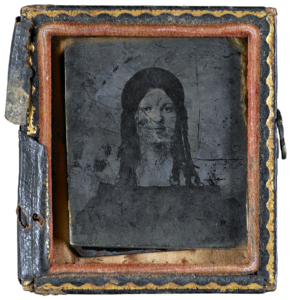
Her letters reflect their painful familial fractures, her anger toward her famous sister and brother-in-law, and Elodie’s determined defense of the Todds to any outsider who might criticize them. Dawson’s letters capture an elite Southern white officer’s early enthusiasm for secession, his frustrations with military life, and his growing disillusion with the war. Their correspondence also reflects the divisions within a Southern community—in Selma and among the soldiers from Selma—struggling with normal social disagreements amid the pressures of distance and war. The excerpts below, which focus on their early correspondence and reactions to the First Battle of Manassas, touch on the issues that weave through the more than 300 letters in the collection. While spanning just a year, Dawson and Todd’s writings capture the exhausting toll the Civil War would take on these two elite families and millions of others.
Selma,
May 9, 1861
Elodie Todd
Ever since I can remember, I have been looked upon and called the ‘old maid’ of the family, and Mother seemed to think I was to be depended on to take care of her when all the rest of her handsomer daughters left her, and I really believe they all think I am committing a sin to give a thought to any other than the arrangements they have made for me. But as this is the age when Secession, Freedom, and Rights are asserted, I am claiming mine and do not doubt but I shall succeed in obtaining them as I have some one to help me in my efforts.
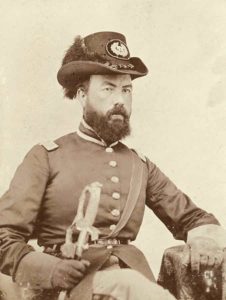
Harpers Ferry,
May 10, 1861
Nathaniel Dawson
We are not as comfortably fixed as we were in our Ala. encampment but comfort is one of the articles we left at home and is therefore not to be regarded.
I sent my trunk yesterday to Winchester…and I do not know when I will again have the benefit of the few little luxuries and comforts it contained. I am now reduced to one suit of clothing and a few articles that a knap sack will contain. I am sorry to say that there are some men in the company too nice to do many of the duties required of them, and I have frequently to [lead by] an example. Some demur to carrying their knapsacks. Yesterday you should have seen their astonishment when I came out of my tent with a knapsack on with all of my accoutrements, rifle, sword and pistol, and large overcoat. I am obliged to do many of these things for the sake of example, and I am subjected to much inconvenience in consequence. But I desire to share all the hardships and dangers of my men as they have manifested much feeling for me on several occasions….
Even now, with their large armies in the field and all the appearance to the contrary, I do not think we will have a long war. The idea of subjugating us must be preposterous, and I think, if I could be allowed to have the ear of my future brother-in-law, I could persuade him to abandon the idea if he ever entertained it. Can’t you use your influence or get your sister Miss Kittie to use hers? I am anxious to know your sister and more anxious to become her brother. Does she look like you? I hope her influence with Mr. Lincoln will save me the trouble of being hanged, should I fall into his power. Is it not strange that I should be so anxious to see Mr. Lincoln defeated in his policy and at the same time be so devoted to his sister-in-law?
Selma,
May 15, 1861
Elodie Todd
The Blues [a local volunteer company] are still making a great noise about going away, have succeeded in obtaining from the citizens 8 or more nice tents and are enjoying pound cake and all delicacies from the ladies in such quantities that they have requested no more to be sent for several days. What a pity you did not encamp for a few days prior to your departure from Selma. Pray remember to do so next time. I am indignant when I think of you all as in danger without tents and a pitiful sum in hand from the generous hearts of this community and Blues at home enjoying everything and peacefully protected without any intention or thought of going, or if they do it will be after the fighting is over.
Manassas,
July 21, 1861
Nathaniel Dawson
We have had a terrible battle today, my dear Elodie, but have achieved a glorious victory. Our brigade was in the hottest of the engagement, and the 4th Ala. Reg. has been cut to pieces. I have had from twenty to thirty killed and wounded in the Cadets, but thanks to a merciful Creator and your prayers, I escaped unscathed. A cannon ball struck a fence which I was crossing and knocked me down, but the only harm done me was a dislocation of my ankle which I do not think will give me much pain….
Selma,
July 23, 1861
Elodie Todd
I wrote you a day or two since, but I cannot refrain from writing to tell, or try to do, my joy and happiness that you have escaped unhurt. Early this morning I sent to town a servant with orders not to return until he brought me news of the battle, which we received intelligence of late yesterday evening. He has just returned bringing me the telegram from yourself and Captain Goldsby relieving by it the anxiety of many hours. I was surprised and distressed when I heard of a battle being fought and you were engaged in it and could do nothing but grieve and anticipate the worse and trembled so violently that for several moments I was incapable of reading the dispatch until with a desperate effort I overcame it somewhat and opened it, my mind prepared to receive the worst. But imagine my joy if you can which possessed me when I read of your safety and the slight loss sustained by the Cadets and Guards….
I see from today’s paper Mrs. Lincoln is indignant at my Bro. David’s being in the Confederate service and declares ‘that by no word or act of hers should he escape punishment for his treason against her husband’s government should he fall into their hands.’ I do not believe she ever said it and if she did and meant it she is no longer a sister of mine nor deserves to be called a woman of nobleness and truth and God grant my noble and brave-hearted brother will never fall into their hands and have to suffer death twice over, and he could do nothing which could make me prouder of him than he is doing now, fighting for his country. What would she do to me, do you suppose? I have as much to answer for.
Manassas, Virginia,
July 24, 1861
Nathaniel Dawson
We, the 4th Ala., with the 2d Miss. And the 6th N.C. Rg., under Ben. Bee commenced the fight by attacking the advancing column of Yankees. Our reg. was supposed to attack 5,000 men and after keeping them in check for one hour, retreated, fell back upon the reserve. I was injured by a sprain in the ankle and missed the Reg. which was in advance and was not further engaged. About 200 of the reg. was collected but took no further active part in the battle. We have but about 200 killed and wounded. Among the former is Lieut. Simpson, whom you saw last winter in Montgomery. He was to be married to Miss Collier….
I walked over the battlefield the next day after the fight. The scene presented was horrible. I counted in one small spot—where Sherman’s battery was taken—thirty-seven horses that were dead and near one hundred dead Yankees, besides the wounded who had been removed. Near this place is a house, an old lady 90 years of age was killed by a cannon ball. Her daughter told me herself at the house. The dead presented an awful appearance, and I thought perchance that the fortunes of man might place me in a similar position. I have learned it seems, however, to think philosophically of these things and am inclined to the opinion that I am hard-hearted.
Near Manassas,
July 25, 1861
Nathaniel Dawson
I have written you three times since the late battle, my own dear Elodie, but it seems that for the first time today I am in a sufficiently quiet state of mind to commune with you. I feel like one who had accomplished a great work and was resting from his labors, and my first impulses after this are to lie down by your side and rest in the knowledge that your heart pulsates to every throb of mine….
I went over the field yesterday. The scene was awful. The dead Yankees were still lying unburied in many places. I saw as many as one hundred in a space of an acre. They belong to Ellsworth’s Zouaves who were reduced from 1,100 to 200 men. God seems specially to have marked them for vengeance. They wore blue pants and red shirts and are fierce looking fellows. They fought well.

Confederate States of America,
Selma, August 4, 1861
Elodie Todd
Tis no easy task, but I am endeavoring to bear everything as well and cheerfully as possible. Sometimes I fail entirely, but in a short time find myself persevering again in the struggle and may yet come out victorious. I do not think of peace and know well Mr. Lincoln is not man enough to dare to make it. He is but a tool in the hands of his party and would not brave their wrath by such a proposition. How nobly he could redeem himself if he had the courage. He is no more fitted for the office than many others who have recently occupied it, and we may date our trouble from the time when we allowed party to place in the chair a President entirely disregarding his worth, ability, or capacity for it, and I hope our Confederacy may guard against it.
I would not be more for him than his party or than for any other Blk. Rep. President, and you do not say as much as I do, tho that is a privilege I allow myself exclusively, to abuse my relations as much as I desire, but no one else can do the same before me or even say a word against Kentucky. I told two gentlemen the other night that as they knew I was a Kentuckian and acknowledged myself as such, that I considered anything they said against my birthplace and home personal, and there were many subjects more entertaining to me than abuse of Kentucky.
I thought if they desired to discuss her movements, they could take themselves off to do it, but as long as a drop of Ky. blood courses in my veins I see myself listening to people who just by a small majority threw off Northern tyranny themselves and before Ky. for I still have faith in her and will ever take her part knowing better than some all the disadvantages she is laboring under.
Manassas Junction,
August 29, 1861
Nathaniel Dawson
I reached camp yesterday safely…. The love I bear you, my dear Elodie, and the intimate future and present relation that exists between us and my desire to let you know all that concerns me makes it proper, on account of rumors that I have heard have reached Selma, to make you, if to no others, a personal explanation of my conduct at the battle of Manassas, for I have no concealment as I am conscious of having done my duty.
I was with my company and the regiment during the battle and fought as well as others did. When we retreated, I was among the last to retire for I was in the rear of Col. Jones, owing to an accident, when he was shot. I was near the chaplain and in crossing a fence in our way, a ball knocked it down, and those who saw have told me I was knocked ten feet on the ground. When I recovered I found my ankle badly sprained. I followed on and overtook the regiment almost a quarter mile ahead, when an attempt was made to rally it. Everything was in great confusion as the Yankees were following us and were then flanking us on both wings. I went up to the colors and called on the Cadets to rally. The disorder was indescribable. Col. Law was now wounded, Col. Jones reported dead, and either with or without an order, for I heard none, the regiment, or that part of it that was there, again retired in my confusion, and brave men had to run for their lives as the enemy now poured upon us a murderous fire of musketry and artillery….
Over three hundred of our regiment became separated and never fell into it after the retreat. As brave and gallant men as breathe. Why I have been made a victim I cannot understand. If I could find out the author of the reports, I will hold him to a strict account. No officer in the regiment, I am glad to say, attaches any importance to this slander, except that is calculated to injure me.

[dropcap]D[/dropcap]awson left the Confederate Army at the expiration of his one-year enlistment in the summer of 1862. The rumors of his cowardice at Manassas did little lasting damage, and he was elected to the state legislature in 1863. Dawson became speaker of the house in 1880, and ran unsuccessfully for governor in 1882 and 1886. The tenderness in their courtship–in one of his last letters from the front, Nathaniel wrote Elodie, “I love you as my own soul”–appears to have continued into marriage. Their happiness, however, was cut short when Elodie Todd succumbed to the same health issue that had plagued Dawson’s previous two wives and several of her sisters. She died giving birth to their fourth child in 1877. “Think of me as always devoted to you,” Nathaniel once told her, and that devotion continued after she died. He spent the next several years turning the Selma cemetery into a living memorial of live oaks, magnolias, and Italian sculpture to his “own dear Elodie.”
Susannah J. Ural is Professor of History and co-director of the Dale Center for the Study of War & Society at the University of Southern Mississippi.
How The Other Half Lived
“Families divided” can be an overused Civil War expression. In the case of Mary Todd Lincoln, wife of President Abraham Lincoln, however, it is apt. Her father, Robert Smith Todd, had eight children by his second wife, Elizabeth Humphreys. In addition to Elodie, all of Mary Todd’s half siblings, and one full brother, George Rogers Clark, expressed loyalty to the Confederacy by service, marriage, or sympathy.

